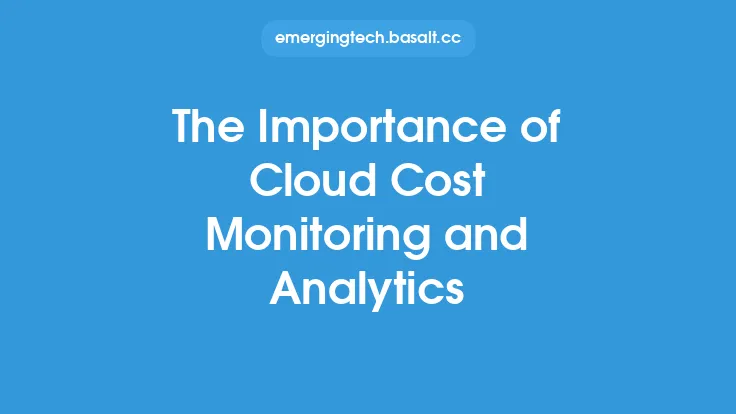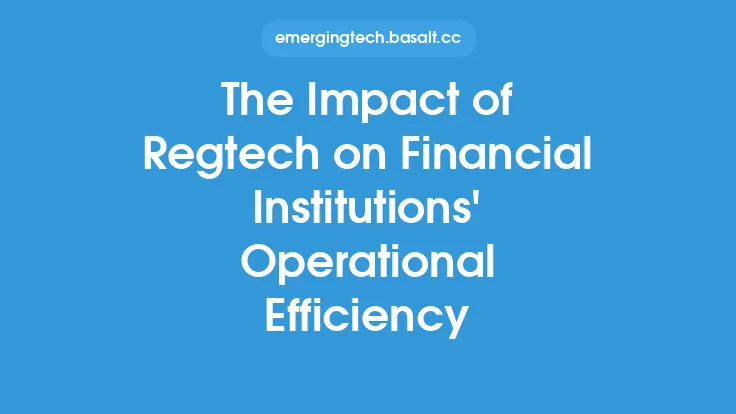The financial sector has undergone significant transformations in recent years, driven in part by the increasing importance of regulatory technology, or regtech. At the heart of regtech lies data analytics, a crucial component that enables financial institutions to navigate the complex landscape of regulatory requirements efficiently. Data analytics in regtech is not just about compliance; it's about leveraging data insights to enhance operational efficiency, reduce risk, and improve customer experience. This article delves into the importance of data analytics in regtech, exploring its applications, benefits, and the technologies that underpin it.
Introduction to Data Analytics in Regtech
Data analytics plays a pivotal role in regtech by providing financial institutions with the tools they need to analyze large datasets, identify patterns, and make informed decisions. The regtech sector utilizes advanced data analytics techniques, including machine learning and artificial intelligence, to automate and streamline regulatory compliance processes. This involves monitoring transactions in real-time to detect and prevent financial crimes, such as money laundering and terrorist financing, and ensuring adherence to regulatory requirements such as Know Your Customer (KYC) and Anti-Money Laundering (AML) laws.
Applications of Data Analytics in Regtech
The applications of data analytics in regtech are diverse and multifaceted. One of the primary uses is in risk management, where data analytics helps in identifying, assessing, and mitigating risks associated with financial transactions and customer interactions. Advanced analytics models can predict the likelihood of a transaction being fraudulent, allowing for real-time intervention. Additionally, data analytics is crucial for regulatory reporting, enabling financial institutions to generate accurate and timely reports that meet the stringent requirements of regulatory bodies. This not only ensures compliance but also reduces the administrative burden associated with manual reporting processes.
Benefits of Data Analytics in Regtech
The benefits of integrating data analytics into regtech solutions are numerous. Firstly, it enhances compliance efficiency by automating many of the manual processes associated with regulatory monitoring and reporting. This automation reduces the risk of human error, which can lead to non-compliance and subsequent fines. Secondly, data analytics improves the effectiveness of risk management strategies by providing real-time insights into potential threats. This proactive approach to risk management can significantly reduce the incidence of financial crimes. Furthermore, data analytics can lead to cost savings by minimizing the resources required for compliance and risk management, allowing financial institutions to allocate these resources more effectively.
Technologies Underpinning Data Analytics in Regtech
Several technologies underpin the use of data analytics in regtech, including big data, cloud computing, and artificial intelligence (AI). Big data technologies, such as Hadoop and NoSQL databases, are essential for storing and processing the vast amounts of data generated by financial transactions. Cloud computing provides the scalability and flexibility needed to handle the variable demands of data analytics workloads. AI and machine learning algorithms are used to analyze this data, identifying complex patterns and anomalies that may indicate fraudulent activity. Additionally, blockchain technology is being explored for its potential to enhance the security and transparency of regulatory data, although its application in regtech is still in its early stages.
Challenges and Future Directions
Despite the importance and benefits of data analytics in regtech, there are challenges that need to be addressed. One of the significant challenges is data quality, as poor data quality can lead to inaccurate insights and ineffective compliance strategies. Ensuring the integrity and consistency of data across different systems and sources is crucial. Another challenge is the evolving nature of regulatory requirements, which demands that regtech solutions be adaptable and agile. Looking forward, the integration of emerging technologies such as quantum computing and the Internet of Things (IoT) into regtech is expected to further enhance the capabilities of data analytics, offering even more sophisticated and real-time insights into financial transactions and regulatory compliance.
Conclusion
In conclusion, data analytics is a foundational element of regtech, enabling financial institutions to comply with regulatory requirements more efficiently, manage risk more effectively, and enhance their operational efficiency. As the financial sector continues to evolve, the importance of data analytics in regtech will only continue to grow. By leveraging advanced data analytics techniques and technologies, financial institutions can not only meet the demands of regulatory compliance but also drive business innovation and growth. The future of regtech is closely tied to the advancements in data analytics, and as these technologies continue to mature, we can expect to see even more innovative applications of data analytics in the financial sector.





